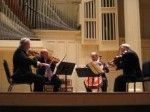Music and the City

At the Colgate Memorial Chapel on both Thursday, October 1 and Friday, October 2, the Manhattan String Quartet performed for the Colgate community at 7 p.m. and 7:30 p.m. respectively. The first program consisted of Bartok’s Quartet Number Six, while Friday night’s included Schubert’s Quartet in D minor, Death and the Maiden, Schubert’s Quartet Number 12 in C minor, Quartettsatz and Shostakovich’s Quartet Number 3, Op. 73.
David McCabe, Associate Professor of Philosophy and Director of CORE 152: The Challenge of Modernity, introduced the event by speaking about the relevance the music had to modern thought and to the CORE classes. He then welcomed Jay Swain, Associate Professor of Music, to the stage. Swain described how a quartet is a conversation between the four instruments: the two violins, the viola and the cello. Further connecting the program, sponsored by CORE, to modernity, he stated that the dilemma of the modern composer is creating an original work, especially since now music is compared to all past pieces as well as the present ones. Whereas in the 1800s, musicians could reuse and rearrange other pieces, the 1900s demanded change. Thus, innovation emerged in compositions such as the ones performed by the Manhattan String Quartet both nights.
On Thursday, Swain elaborated on the composer Bela Bartok, a Hungarian musician inspired by his nation’s folktales who wrote music with its irregularities still intact rather than having been corrected, therefore becoming an inventive musician and standing out from others of his time.
Swain also mentioned that the Western world, unlike the rest of the globe, prefers music with multiple melodies occurring simultaneously, which is what Bartok’s quartet did in its four movements. As Swain discussed each movement, the musicians played an excerpt from it and then they performed other brief pieces by Bartok, including a march and a dance song. The entire 6th Quartet was performed last of all. The final movement of Bartok’s Quartet Number Six ends with almost tragic sounds, breaking from the norm of quartets, but, having been written in 1939, these concluding notes aptly reflect the state of Europe at the outbreak of World War II.
The members of the Quartet are Eric Lewis, Calvin Wiersma, both on violin, John Dexter on viola and Chris Finckel on the cello. The Quartet, having performed in the United States, Mexico, Canada, South America and across Europe, is currently in its 39th season. The group has become renowned for its versions of classics from the 20th century, most particularly the work of Dmitri Shostakovich.
The nearly packed Chapel audience could not only appreciate the work of classic composers such as Bartok and Schubert, but they could also learn about modern Western music and how it relates to our society. Although classical music today is less popular than it has been in past centuries, exposure to it can help Colgate students better understand modern society. In this way, the quartet’s visit to Colgate benefits all students, but especially those currently enrolled in The Challenge of Modernity.
Contact Bridget Sheppard at [email protected].






